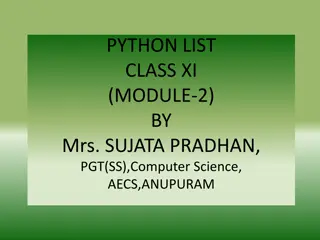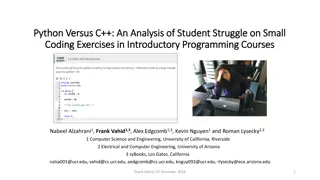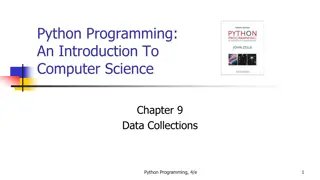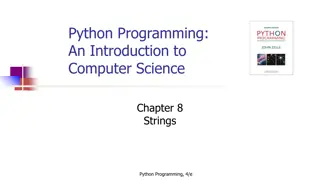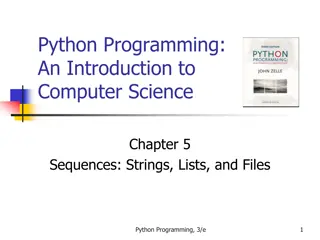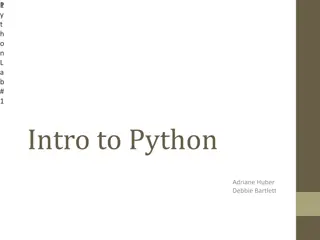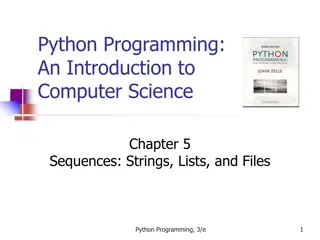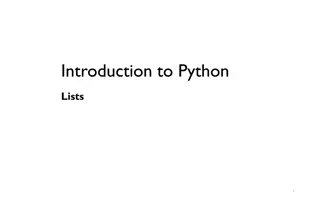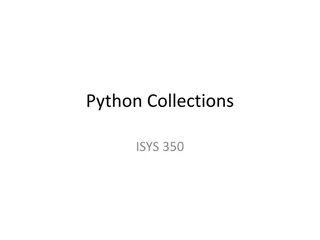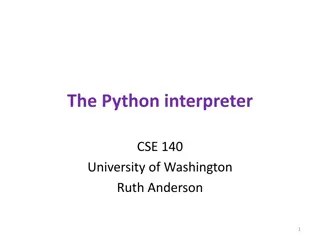Understanding Python Lists Operations
Python lists are versatile data structures that allow for efficient creation, querying, modification, insertion, removal, replacement, and rearrangement of elements. This comprehensive guide covers essential list operations such as extracting parts of a list, finding elements, and altering list content in Python, providing insights for effective list manipulation.
Download Presentation

Please find below an Image/Link to download the presentation.
The content on the website is provided AS IS for your information and personal use only. It may not be sold, licensed, or shared on other websites without obtaining consent from the author. Download presentation by click this link. If you encounter any issues during the download, it is possible that the publisher has removed the file from their server.
E N D
Presentation Transcript
Lists Ruth Anderson University of Washington CSE 160 Winter 2017 1
What is a list? A list is an ordered sequence of values 3 1 4 4 5 9 Four score and seven years What operations should a list support efficiently and conveniently? Creation Querying Modification 2
See in python tutor List creation a = [ 3, 1, 2 * 2, 1, 10 / 2, 10 - 1 ] 3 1 4 1 5 9 b = [ 5, 3, 'hi' ] c = [ 4, 'a', a ] d = [ [1, 2], [3, 4], [5, 6] ] 3
List Querying Extracting part of the list: Single element: mylist[index] Sublist ( slicing ): mylist[startidx : endidx] Find/lookup in a list elt in mylist Evaluates to a boolean value mylist.index(x) Return the int index in the list of the first item whose value is x. It is an error if there is no such item. mylist.count(x) Return the number of times x appears in the list. 4
List Modification Insertion Removal Replacement Rearrangement 5
See in python tutor List Insertion mylist.append(x) Extend the list by inserting x at the end mylist.extend(L) Extend the list by appending all the items in the argument list mylist.insert(i, x) Insert an item before the a given position. a.insert(0, x)inserts at the front of the list a.insert(len(a), x) is equivalent to a.append(x) Note: append, extend and insert all return None 6
List Removal mylist.remove(x) Remove the first item from the list whose value is x It is an error if there is no such item Returns None Notation from the Python Library Reference: The square brackets around the parameter, [i] , means the argument is optional. It does not mean you should type square brackets at that position. mylist.pop([i]) Remove the item at the given position in the list, and return it. If no index is specified, a.pop() removes and returns the last item in the list. 7
List Replacement mylist[index] = newvalue mylist[start:end] = newsublist Can change the length of the list mylist[start:end] = [] removes multiple elements a[len(a):] = L is equivalent to a.extend(L) 8
List Rearrangement list.sort() Sort the items of the list, in place. in place means by modifying the original list, not by creating a new list. list.reverse() Reverse the elements of the list, in place. Note: sort and reverse return None 9
How to evaluate a list expression There are two new forms of expression: [a, b, c, d] To evaluate: evaluate each element to a value, from left to right make a list of the values The elements can be arbitrary values, including lists ["a", 3, 3.14 * r * r, fahr_to_cent(-40), [3 + 4, 5 * 6]] List expression list creation Same tokens [] with two distinct meanings a[b] To evaluate: evaluate the list expression to a value evaluate the index expression to a value if the list value is not a list, execution terminates with an error if the element is not in range (not a valid index), execution terminates with an error the value is the given element of the list value (counting from zero) list indexing or dereferencing Index expression 10
See in python tutor List expression examples What does this mean (or is it an error)? ["four", "score", "and", "seven", "years"][2] ["four", "score", "and", "seven", "years"][0,2,3] ["four", "score", "and", "seven", "years"][[0,2,3]] ["four", "score", "and", "seven", "years"][[0,2,3][1]] 11
Exercise: list lookup def index(somelist, value): """Return the position of the first occurrence of the element value in the list somelist. Return None if value does not appear in somelist.""" Examples: gettysburg = ["four", "score", "and", "seven", "years", "ago"] index(gettysburg, "and") => 2 index(gettysburg, "years") => 4 Fact: mylist[index(mylist, x)] == x 12
See in python tutor Exercise: list lookup (Answer #1) def index(somelist, value): """Return the position of the first occurrence of the element value in the list somelist. Return None if value does not appear in somelist.""" i = 0 for c in somelist: if c == value: return i i = i + 1 return None 13
See in python tutor Exercise: list lookup (Answer #2) def index(somelist, value): """Return the position of the first occurrence of the element value in the list somelist. Return None if value does not appear in somelist.""" for i in range(len(somelist)): if somelist[i] == value: return i return None 14
Exercise: Convert Units ctemps = [-40, 0, 20, 37, 100] # Goal: set ftemps to [-40, 32, 68, 98.6, 212] # Assume a function celsius_to_fahrenheit exists ftemps = [] 15
Exercise: Convert Units (Answer) ctemps = [-40, 0, 20, 37, 100] # Goal: set ftemps to [-40, 32, 68, 98.6, 212] # Assume a function celsius_to_fahrenheit exists ftemps = [] for c in ctemps: f = celsius_to_farenheit(c) ftemps.append(f) 16
List Slicing mylist[startindex:endindex] evaluates to a sublist of the original list mylist[index] evaluates to an element of the original list Arguments are like those to the range function mylist[start:end:step] start index is inclusive, end index is exclusive All 3 indices are optional Can assign to a slice: mylist[s:e] = yourlist 17
See in python tutor List Slicing Examples test_list = ['e0', 'e1', 'e2', 'e3', 'e4', 'e5', 'e6'] From e2 to the end of the list: test_list[2:] From beginning up to (but not including) e5: test_list[:5] Last element: test_list[-1] Last four elements: test_list[-4:] Everything except last three elements: test_list[:-3] Reverse the list: test_list[::-1] Get a copy of the whole list: test_list[:] 18



